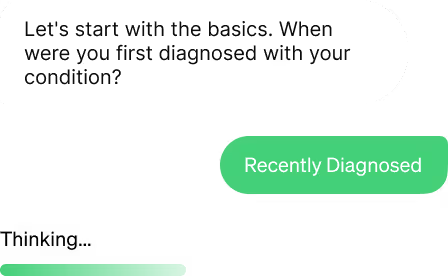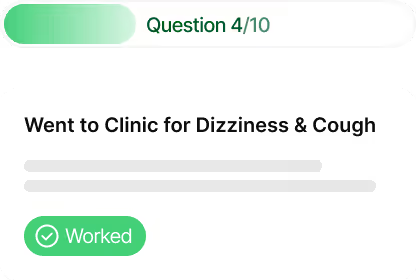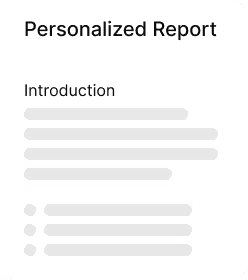Your personal
AI assistant for
Thyroid Eye Disease

.avif)
.avif)
.avif)
.avif)



.avif)


.avif)
.avif)
.avif)
.avif)



.avif)


.avif)
.avif)
.avif)
.avif)



.avif)


Our platform gives you a space to track your symptoms, prepare for ophthalmology or endocrinology visits, and learn from insights shared by others living with TED. Whether you’re managing eye pain or swelling, adjusting to visual changes, or looking for questions to ask your doctor, mama health helps you stay informed and in control of your care.
You’re not alone in this. mama health is built to walk with you through the ups and downs of Thyroid Eye Disease, helping you understand your symptoms, monitor your progress with confidence, and advocate for the care you deserve.
What is thyroid eye disease?
Thyroid eye disease (TED), also known as endocrine orbitopathy, is an inflammatory condition affecting the tissues around the eyes, often linked to thyroid disorders. Depending on the severity, treatment may involve conservative approaches or surgical intervention.
Thyroid dysfunction, particularly autoimmune conditions, can lead to various eye-related symptoms collectively referred to as thyroid Eeye disease (TED). These symptoms arise when inflammation occurs in the eye socket, affecting muscles, connective tissue, and fatty tissue.
In 90-95% of cases, TED is associated with Graves' disease, an autoimmune thyroid condition that causes hyperthyroidism. In 3-5% of cases, TED can occur with Hashimoto’s thyroiditis, a condition leading to hypothyroidism.
Inflammation triggered by autoimmune thyroid diseases results in:
- Fluid retention: Causes swelling in soft tissues around the eyes.
- Tissue growth: Leads to an increase in connective and fatty tissues in the eye socket.
- Eye protrusion: The swelling and tissue expansion push the eyeball forward, resulting in the characteristic bulging appearance.
By understanding the connection between thyroid diseases and TED, patients and healthcare providers can identify the condition early and explore treatment options tailored to the severity of the symptoms.


Thyroid Eye Disease (TED) is often characterized by protruding eyes, along with swelling and redness around the eyelids and conjunctiva. These hallmark symptoms can significantly impact daily life and comfort.
The most common symptoms are:
- Dryness and irritation
- Gritty or foreign body sensation in the eyes
- Dryness and redness
- Pain and pressure
- Restricted mobility
- Difficulty focusing and discomfort
- Double vision (diplopia)
- Impaired visual clarity
Complications: In rare cases, swelling, and pressure within the eye socket can damage the optic nerve. This may result in reduced vision or, in extreme cases, permanent vision loss if left untreated. Recognizing these symptoms early and seeking medical intervention can help manage TED and prevent potential complications like optic nerve damage.
How can mama health help?




Developed and supervised by medical experts
What patients are saying
There are so many testimonies and so many people like me.
I hope this platform grows so we can help so many people who feel alone with a disease.
In the end we are many and all together we can fight.❤️"
There are so many testimonies and so many people like me.
I hope this platform grows so we can help so many people who feel alone with a disease.
In the end we are many and all together we can fight.❤️"
Frequently asked questions
The healthcare system is missing a crucial piece—real patient experiences. We bring those voices back into the system, making healthcare truly patient-centric. By connecting data from patients, doctors, hospitals, and research, we help unlock new insights, improve treatments, and turn today’s incurable diseases into tomorrow’s breakthroughs.
- See what works – Learn from others with the same condition and avoid trial-and-error treatments.
- Get a clear health picture – Track your journey, compare with others, and gain deeper understanding.
- Be part of something bigger – Your experience helps improve healthcare and accelerate research.
We use the information shared on mama health to improve treatments and services for all patients. However, we ensure that no one—neither other patients, scientists, nor healthcare companies—can identify you personally.
To request the deletion of your data, simply send an email to support@mamahealth.com.

.avif)

.avif)









.jpg)


